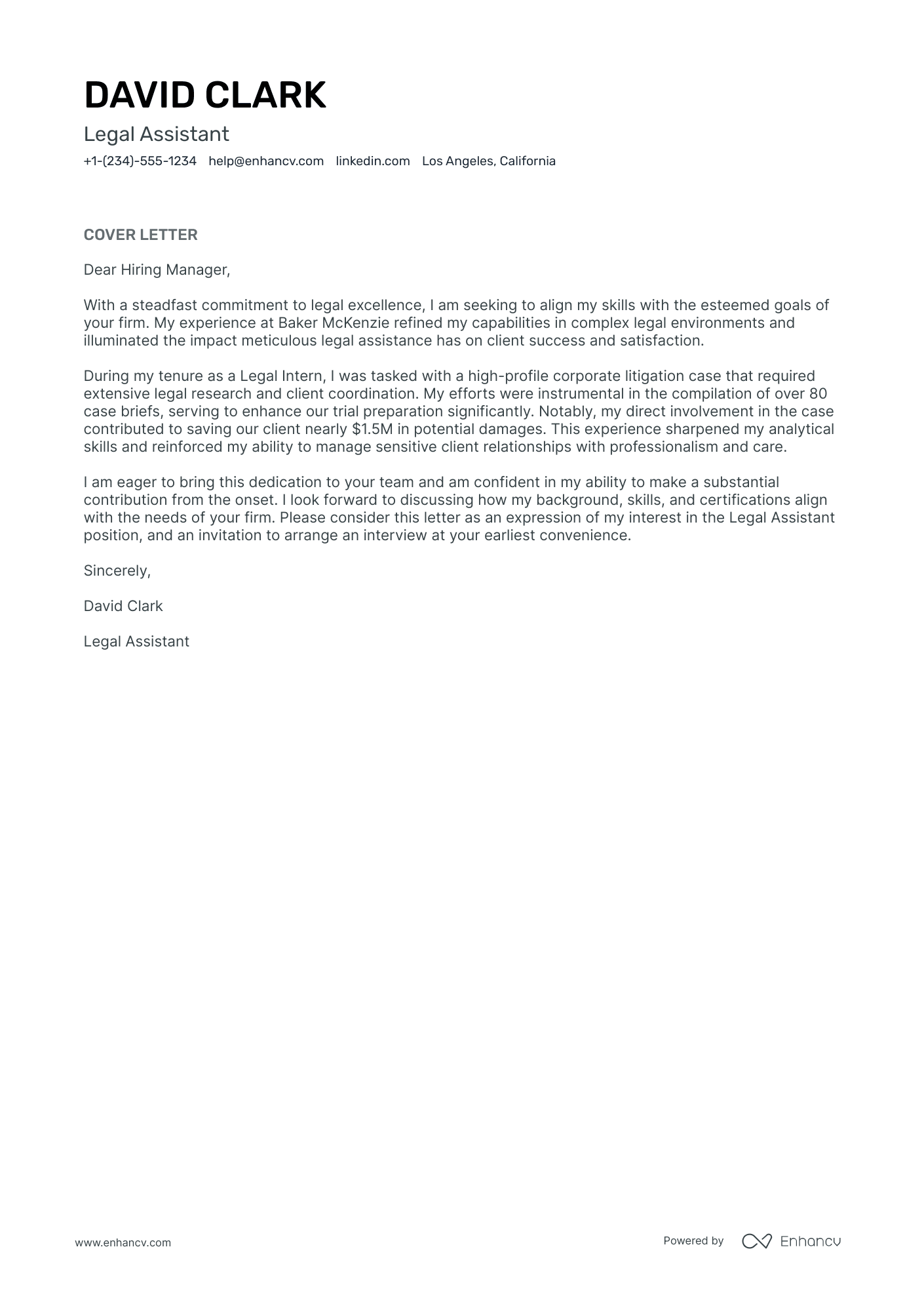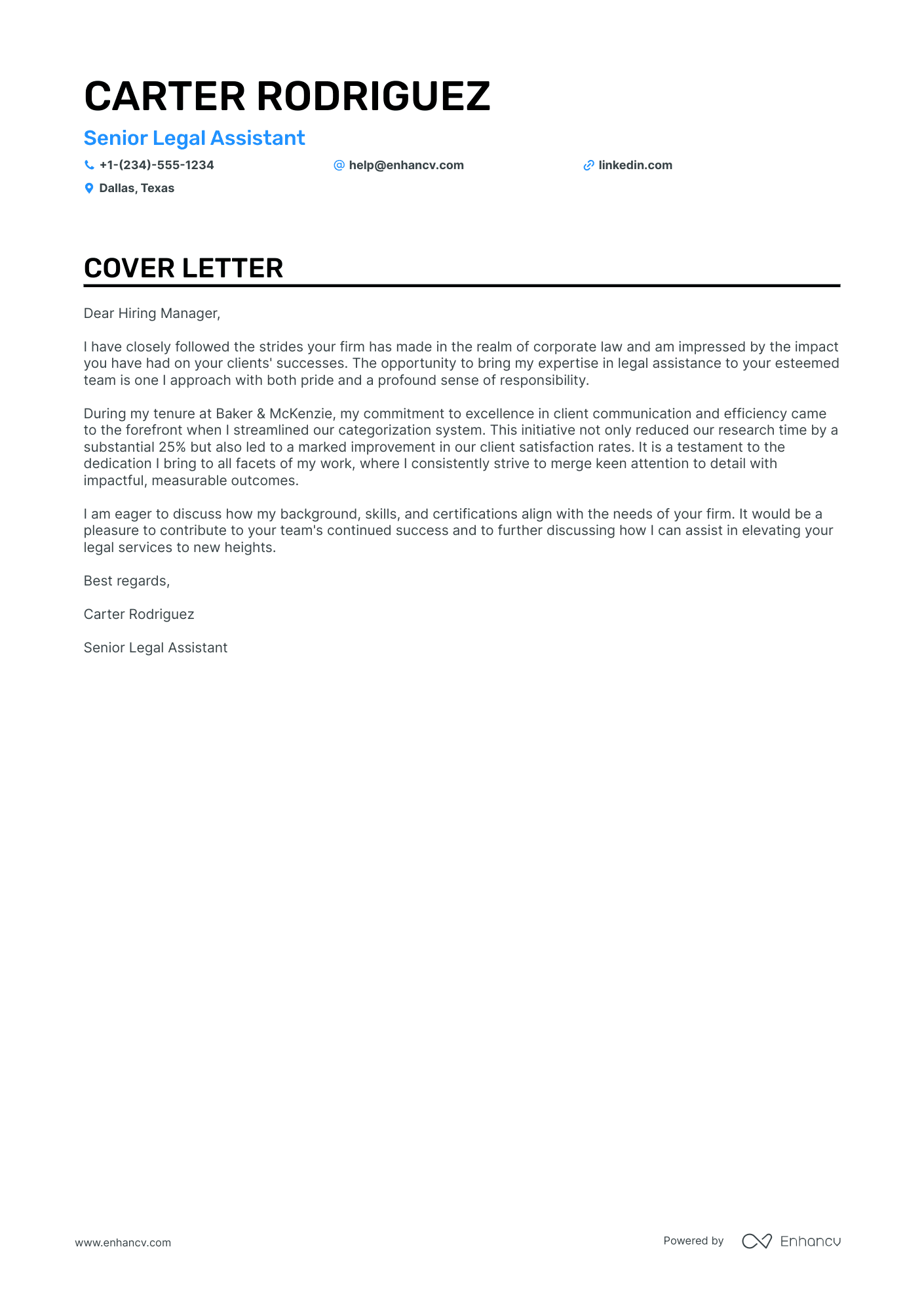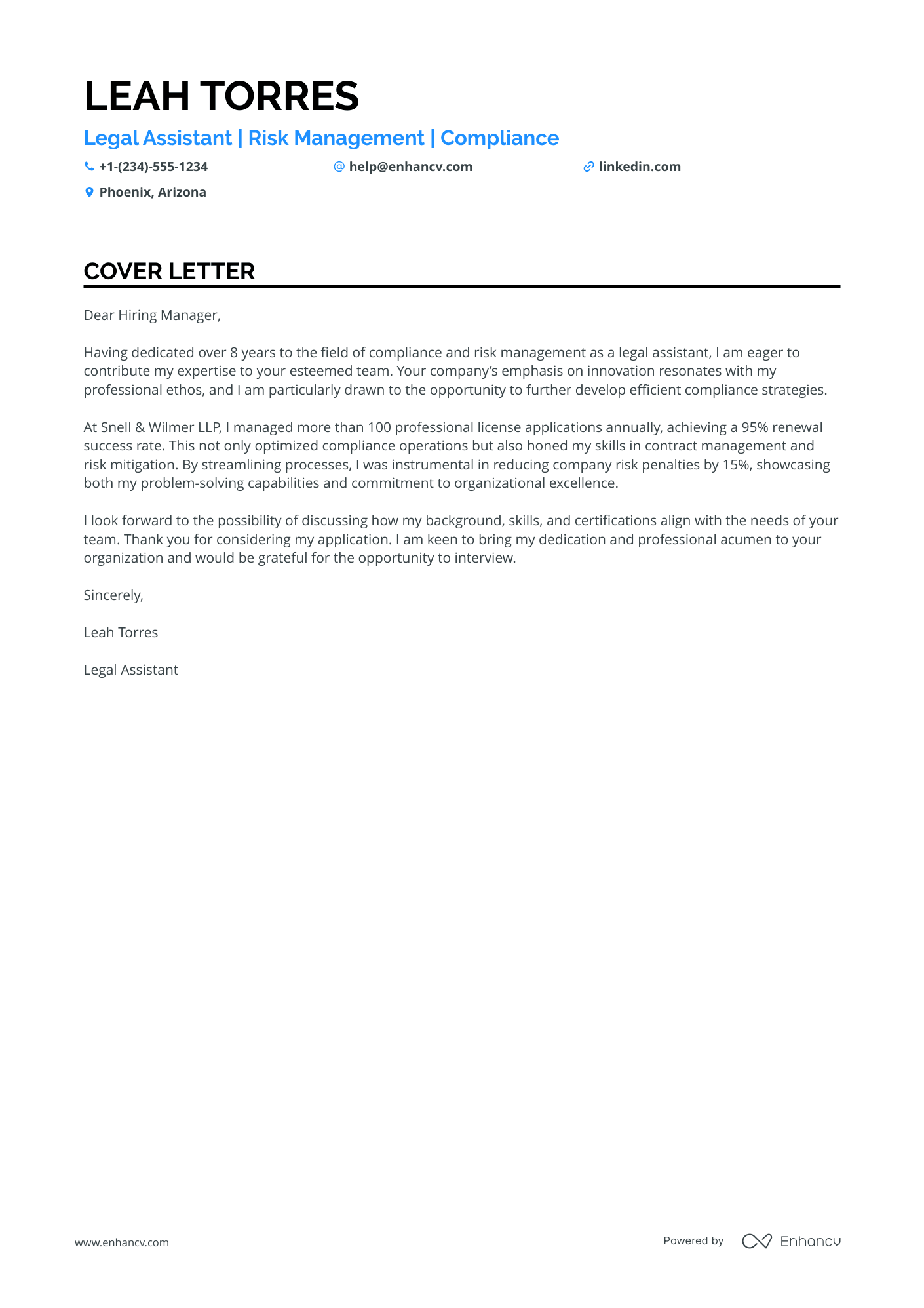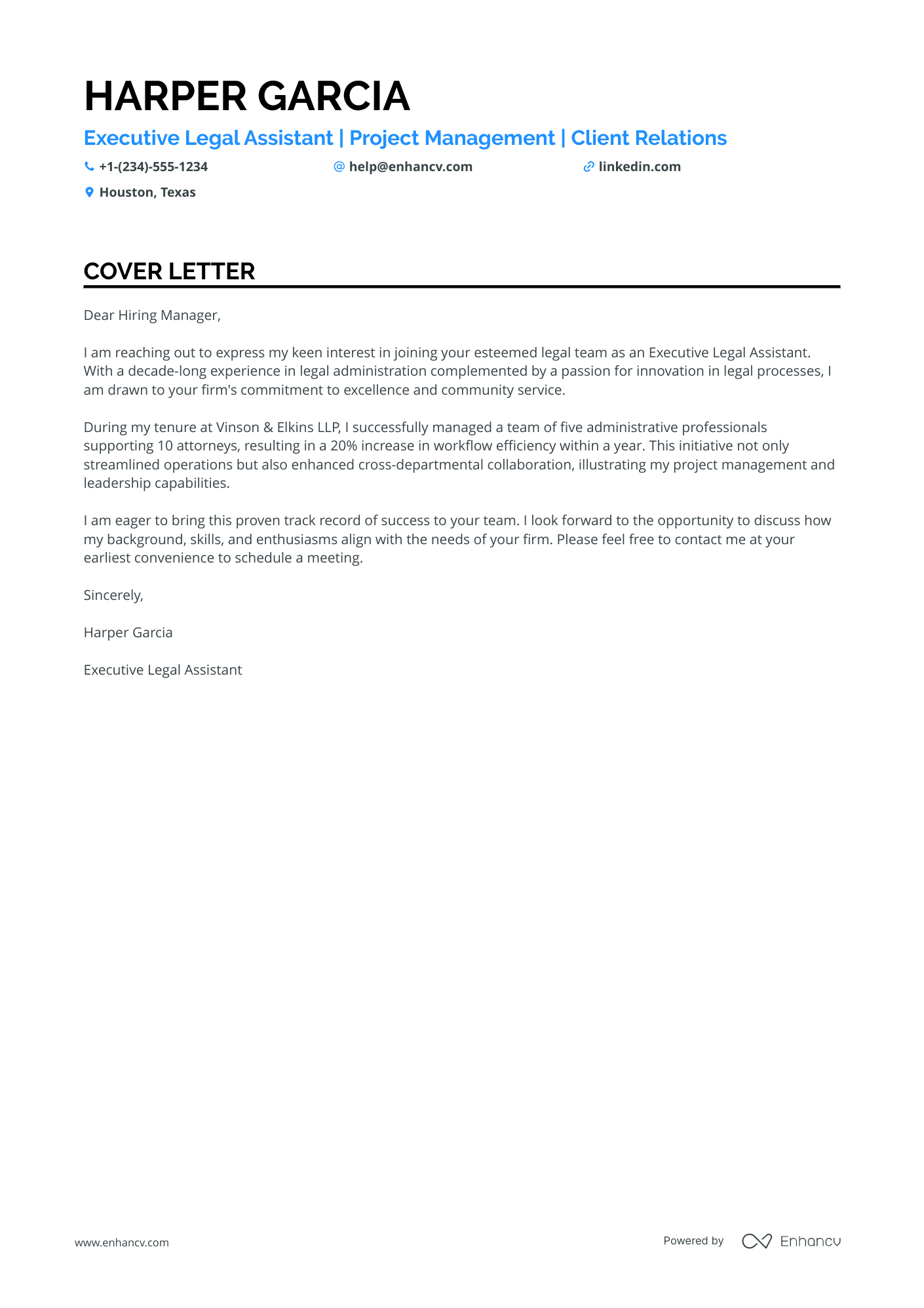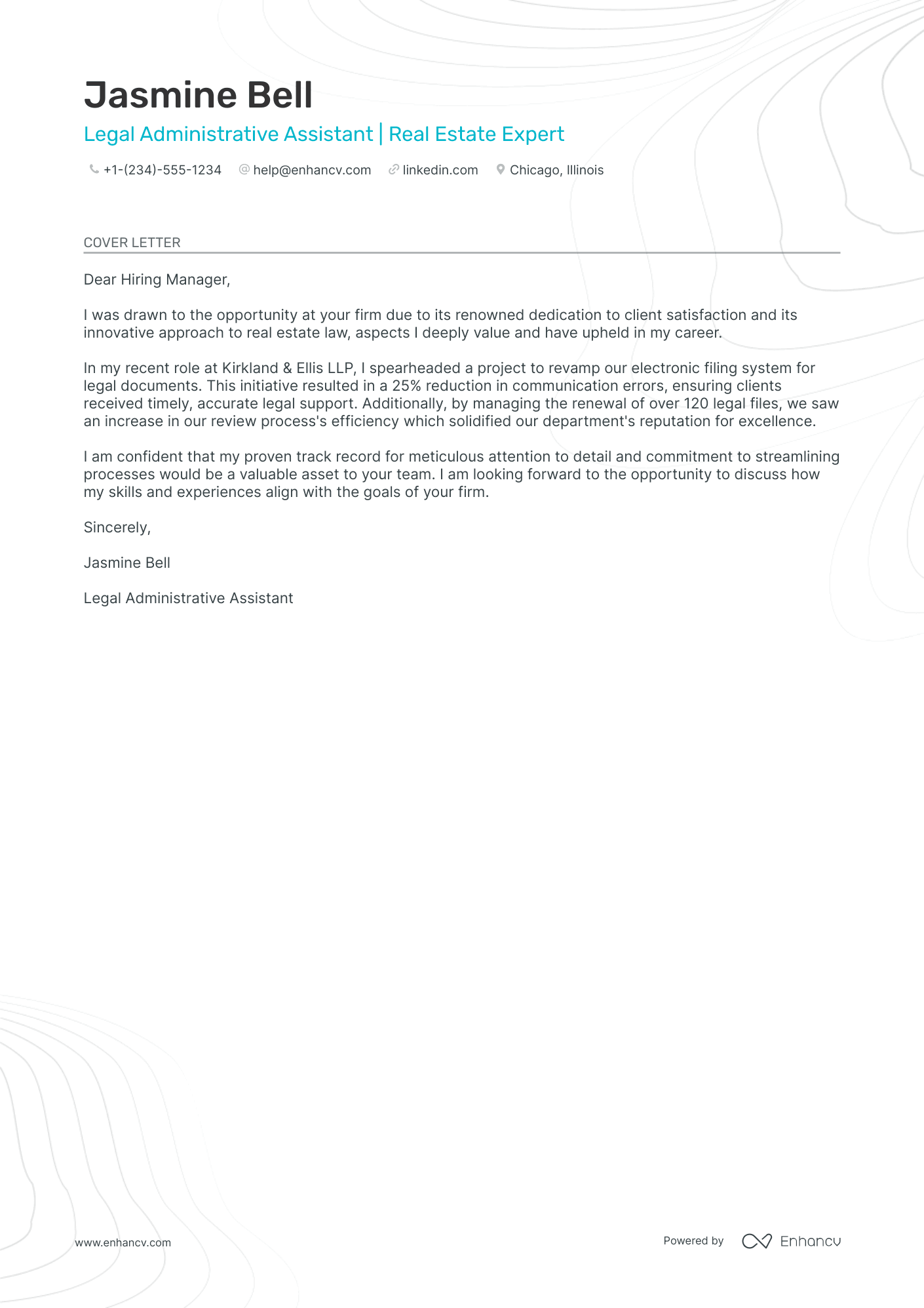Crafting a standout legal assistant cover letter can seem daunting, especially after you've hit the 'apply' button and realized it's not just your resume that needs to shine. Your cover letter must tell a compelling story without echoing your resume, highlight your proudest professional achievement, and maintain a balance between formality and originality – all in under one page. Let's tackle these challenges and make your application memorable without falling into the trap of clichés.
- Making excellent use of job-winning real-life professional cover letters;
- Writing the first paragraphs of your legal assistant cover letter to get attention and connect with the recruiters - immediately;
- Single out your most noteworthy achievement (even if it's outside your career);
- Get a better understanding of what you must include in your legal assistant cover letter to land the job.
Let the power of Enhancv's AI work for you: create your legal assistant cover letter by uploading your resume.
If the legal assistant isn't exactly the one you're looking for we have a plethora of cover letter examples for jobs like this one:
- Legal Assistant resume guide and example
- Real Estate Legal Assistant cover letter example
- Senior Paralegal cover letter example
- Corporate Counsel cover letter example
- Immigration Lawyer cover letter example
- In House Counsel cover letter example
- Criminal Lawyer cover letter example
- Personal Injury Lawyer cover letter example
Drop your resume here or choose a file.
PDF & DOCX only. Max 2MB file size.
Legal assistant cover letter example
AVA JOHNSON
Phoenix, Arizona
+1-(234)-555-1234
help@enhancv.com
- Demonstration of concrete achievements, such as the design and implementation of a new document management system that improved productivity, showcases how the candidate applies skills to generate tangible results.
- Quantifying success, by noting specific percentages in efficiency gains and the value of transactions overseen, provides measurable proof of the candidate's competency and impact in previous roles.
- Highlighting leadership experience through management of a team of paralegals indicates readiness for responsibility and an ability to mentor and lead within a team.
- Expressing enthusiasm for the role and alignment with the firm’s goals helps to personalize the cover letter, making it clear that the candidate has a genuine interest in the specific opportunity and organization.
The visual appeal of your legal assistant cover letter: format, font, and structure
When using our cover letter builder, make sure to include these vital sections:
- Header (with your name, contact details, the role, and date);
- Greeting (that's personalized to the recruiter);
- Introductory paragraph (to capture attention);
- Body paragraph (to tell a story of how you've obtained your job-crucial skills);
- Closing paragraph (ending with a nod to the future ahead);
- Signature (that is not a must).
Our cover letter templates are already set up for you with the best legal assistant cover letter design with single-spaced paragraphs and a one-inch margin.
As for the font of your legal assistant cover letter, use the same one as you did in your resume (where modern and simple fonts, like Rubik and Bitter, take precedence over Arial and Times New Roman).
Your legal assistant cover letter is created with the recruiters in mind - as no Applicant Tracker System looks over this part of your profile.
When sending over your legal assistant cover letter, download it in PDF. This format allows your information and design to stay intact and to keep the same visual quality.
Skip the hassle of writing a cover letter. Use our free cover letter generator and get it done in moments.
The top sections on a legal assistant cover letter
Header: This should contain the applicant's contact information, the date, and the address of the law firm or employer, establishing a professional tone and making it easy for the recruiter to reach out.
Greeting: Address the letter to a specific person if possible, such as "Dear Mr./Ms. [Last Name]," to demonstrate attention to detail and a personalized approach which is essential in legal work.
Introduction: Briefly mention the legal assistant position applied for, how you learned about it and include a strong opening statement that highlights your most relevant qualification or experience to instantly grab the recruiter's attention.
Body: Detail your relevant skills, experiences, and accomplishments, particularly those involving legal research, document preparation, case management, and client interaction, thereby showcasing your capability to handle responsibilities specific to a legal assistant role.
Closing: Reiterate your enthusiasm for the position, thank the recruiter for considering your application, and indicate your willingness to provide further information or attend an interview, ending the letter with a professional and proactive conclusion.
Key qualities recruiters search for in a candidate’s cover letter
- Attention to detail: Essential for reviewing and preparing accurate legal documents.
- Strong organizational skills: Necessary to manage case files and coordinate various tasks efficiently.
- Ability to maintain confidentiality: Paramount for handling sensitive client information and adhering to legal privacy standards.
- Proficiency with legal software and technology: Critical for drafting documents, conducting research, and streamlining workflow.
- Excellent written and verbal communication skills: Important for drafting clear legal correspondence and effectively interacting with attorneys, clients, and court personnel.
- Knowledge of legal terminology and procedures: Fundamental to understanding and assisting with the processes involved in legal cases.
What greeting should you use in your legal assistant cover letter salutation
A simple "Hello" or "Hey" just won't work.
With your legal assistant cover letter salutation, you set the tone of the whole communication.
You should thus address the hiring managers by using their first (or last name) in your greeting.
But how do you find out who's recruiting for the role?
The easiest way is to look up the role on LinkedIn or the corporate website.
Alternatively, you could also contact the organization via social media or email, for more information.
Unable to still obtain the recruiter's name?
Don't go down the "To whom it may concern path". Instead, start your cover letter with a "Dear HR team".
List of salutations you can use
- Dear Hiring Manager,
- Dear [Law Firm Name] Team,
- Dear [Specific Attorney's Name],
- Dear Ms./Mr. [Last Name],
- Esteemed Members of [Law Firm Name],
- Respected [Job Title or Department],
Your legal assistant cover letter intro: showing your interest in the role
On to the actual content of your legal assistant cover letter and the introductory paragraph.
The intro should be no more than two sentences long and presents you in the best light possible.
Use your legal assistant cover letter introduction to prove exactly what interests you in the role or organization. Is it the:
- Company culture;
- Growth opportunities;
- Projects and awards the team worked on/won in the past year;
- Specific technologies the department uses.
When writing your legal assistant cover letter intro, be precise and sound enthusiastic about the role.
Your introduction should hint to recruiters that you're excited about the opportunity and that you possess an array of soft skills, e.g. motivation, determination, work ethic, etc.
That one achievement in your legal assistant cover letter body
The lengthiest part of your legal assistant cover letter is the body.
Within the next three to six middle paragraphs, present yourself as the best candidate for the role.
How can you do that without retelling your whole professional resume?
Select one key achievement that covers job-crucial skills and technologies (and is memorable).
Within the body of your legal assistant cover letter, aim to tell the story of how you achieved your success. Also, write about how this would help out your potential team.
Finishing off your legal assistant cover letter with what matters most
So far, you've done a fantastic job in tailoring your legal assistant cover letter for the role and recruiter.
Your final opportunity to make a good impression is your closing paragraph.
And, no, a "Sincerely yours" just won't do, as it sounds too vague and impersonal.
End your legal assistant cover letter with the future in mind.
So, if you get this opportunity, what do you plan to achieve? Be as specific, as possible, of what value you'd bring to the organization.
You could also thank recruiters for their interest in your profile and prompt for follow-up actions (and organizing your first interview).
What could you write about in your legal assistant cover letter when you have no experience
Candidates with zero professional experience often struggle to write their legal assistant cover letter.
You may lack experience, but your application could still be impressive when you focus on your strengths.
Consider your most relevant talents (and/or one achievement) that align with the role and help you stand out.
Perhaps you spent every summer volunteering at your local dog pound - think of the job-relevant skills this experience taught you.
Sharing your tangible career goals is another good strategy to stand out.
Key takeaways
Your legal assistant cover letter is your best shot at standing out by showing your motivation and the unique skills you'd bring to the job:
- Chose no more than one achievement, which you'd be talking about in the body of your legal assistant cover letter, by focusing on skills and outcomes;
- Address recruiters with their first or last name, or "Dear Hiring Manager" in your legal assistant cover letter greeting;
- Introduce in no more than two sentences what makes your profile unique (perhaps it's your motivation, enthusiasm, or appreciation of the company you're applying for);
- Select the same font you have used in your resume (avoid Times New Roman and Arial, as most candidates tend to invest in them);
- Close your legal assistant cover letter with a promise of how you see yourself growing in the company and the benefits you'd bring about.
Legal Assistant cover letter examples
By Experience
Entry-Level Legal Assistant
Senior Legal Assistant
Mid-Level Legal Assistant
- Emphasizing Industry-Specific Experience: The cover letter highlights over 8 years of experience in compliance and risk management, which is crucial for roles in legal support and risk mitigation.
- Showcasing Quantifiable Success: It includes specific achievements, such as a 95% renewal success rate and a 15% reduction in company risk penalties, demonstrating the applicant's effectiveness and value.
- Aligning with Company Values: The letter mentions the applicant's interest in the company's focus on innovation, showing alignment between personal ethos and company goals.
Chief Legal Assistant
- Highlight Specific Experience: The letter emphasizes a decade-long experience in legal administration, which is crucial for an Executive Legal Assistant role.
- Demonstrate Leadership and Impact: It mentions managing a team and achieving a 20% increase in workflow efficiency, showcasing leadership skills and the ability to drive impactful results.
- Align with Company Values: The applicant expresses admiration for the firm's commitment to excellence and community service, aligning personal values with the company's mission.
- Express Enthusiasm and Availability: The letter concludes with eagerness to discuss the role further and provides contact availability, demonstrating interest and proactive communication.
By Role
